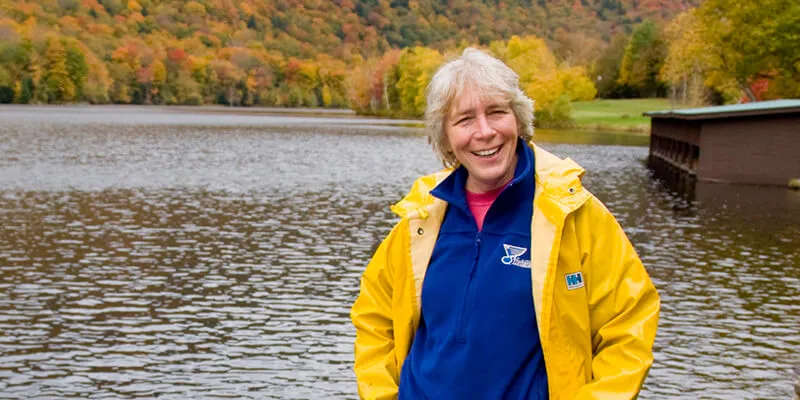Research Professor Donna Parrish of the University of Vermont (UVM) Rubenstein School of Environment and Natural Resources has been named a fellow of the American Fisheries Society (AFS), the oldest and largest fisheries science society in the world. Dr. Parrish and seven other fellows were recognized for outstanding contributions in leadership, research, teaching, resource management, conservation, and outreach in fisheries at the Society’s 146th annual meeting in Kansas City, Missouri in August 2016.
As leader of the Vermont Cooperative Fish and Wildlife Research Unit, a partnership of the U.S. Geological Survey, the state of Vermont Department of Fish and Wildlife, UVM, and the Wildlife Management Institute, since 1995, Parrish has made major contributions to fisheries research and management and graduate level teaching. She and Research Associate Professor Therese Donovan, the unit’s assistant leader, conduct wildlife and fisheries related research that benefits state and federal cooperators, educate graduate students in the Rubenstein School to become practicing professionals, and provide technical assistance to cooperators.
During her long and active affiliation with the AFS, Parrish served as president of the Society, president of the Education Section and of the Northeastern Division and participated on numerous committees. She also co-edited Fisheries Techniques, 3rd Edition, published by the AFS.
“It is an honor to be recognized by the American Fisheries Society, which I consider to be my ‘home society’,” said Parrish, who has been a member since she was a student in 1982. “It is through the Society and my colleagues that I have developed most of my professional relationships that have benefited my career as a research scientist in fisheries.”
Her research focuses on restoration of native fishes, acoustical sampling, and fish bioenergetics. She is currently starting a new project on lake sturgeon, a historically endangered fish, in Lake Champlain with doctoral student Lisa Izzo and co-principal investigators in the Vermont Department of Fish and Wildlife and at the University of Maine. Using new technology in acoustics, the research team is estimating the numbers of sturgeon entering and leaving spawning rivers to obtain a better baseline measure of population size.
As part of a Connecticut River migratory fish project, Parrish is modeling population dynamics of American shad to understand how climate change effects on water temperature and flows will impact shad populations. Her past research includes assessment of stonecat in the Missisquoi and LaPlatte Rivers of Vermont, sampling methods and genetics of mudpuppies in Vermont, and studies of rainbow smelt and alewife in Lake Champlain. Parrish has taught a course on the ecology of fishes for many years and several graduate seminar courses.
The mission of the American Fisheries Society (AFS), founded in 1870, is to improve the conservation and sustainability of fishery resources and aquatic ecosystems by advancing fisheries and aquatic science and promoting the development of fisheries professionals. Qualifications for the Fellows program include receiving a major AFS award, serving as journal editor at least five years, or serving as president of the Society.
